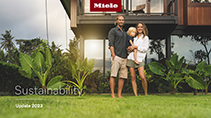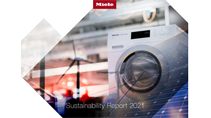Press releases
Circular economy: Miele presents a concept for a circular vacuum cleaner at IFA

-
Design follows the “cradle-to-cradle” principle: with lots of recyclate and recyclable
-
Separate presentation dedicated to circularity in Hall 27 with presentations and talks on international pilot projects
-
Repair challenge for visitors
Always thinking in circles, or: How can a premium domestic appliance be designed with the circular economy in mind? This question was the starting point for the design study of a circular vacuum cleaner that Miele will be presenting for the first time at IFA. The ‘Vooper’ study shows a cordless handstick with a fully modular design. Its comprehensive dismantling capability enables the valuable materials to be almost completely returned to the material cycle at the end of its life cycle. This and other projects show that Miele is working intensively on the principle of the circular economy and is continuously strengthening its commitment to the conversation of resources.
“Implementing the circular economy is one of the most exciting and at the same time most complex issues of our time”, emphasises Rebecca Steinhage, Executive Director Human Resources and Corporate Affairs. “If we succeed in realising this, even in part, we will be making a major contribution to conserving resources, reducing our carbon footprint, and making our company more competitive.” The design study now presented is an example of the company's commitment.
A vacuum cleaner based on the "cradle-to-cradle" principle
Miele calls the concept study ‘Vooper’, made up of ‘Vac’ (vacuum cleaner) and ‘Loop’ (cycle). “It's not enough just to change the materials”, says Andreas Enslin, Vice President Design at Miele, explaining the challenges. “A product like this has to be designed in a completely new and different way so that the materials can be returned to the cycle in the end.”
Plastics were therefore a major issue during development: as in other products, many different types of plastic are often used in household appliances, some of which are glued together in inseparable bonds. These are also used for reasons of product safety and impermeability – but make complete recovery and therefore recycling impossible. “We have managed to get by with far fewer types of plastic, which can also be separated by type,” explains the head designer, “without any negative consequences for quality or design.”
Monomaterial was used instead of plastic mixtures, and plug-in and screw connections were used instead of adhesives. The material was sourced from recycling processes and is in turn completely recyclable. For the metal parts, ‘green aluminium’ was used, i.e. aluminium produced in a CO2-neutral way. Miele already has experience with this: it is used in their ovens.
All maintenance elements, such as the filter or battery, are easily accessible on the ‘Vooper’ and are color-coded for better identification. The modular concept of the cordless handstick makes cleaning and repairs easier. Consumers can easily replace components themselves. “Even an upgrade is conceivable,” says Andreas Enslin, “for example replacing the battery or the control unit with more powerful components.” To make maintenance even easier during the extremely long service life of the appliance, the integrated filter cleans itself automatically – a patent application has even been filed for this innovative system.
The study of a circular Miele vacuum cleaner was developed in close collaboration with Professor Dr Michael Braungart, co-founder of the cradle-to-cradle principle, which aims to achieve a fully circular economy in which materials do not become waste but remain in the cycle.
Presentations and talks on circularity at a dedicated stand
At IFA, Miele will be showcasing the vacuum cleaner design study on a separate stand in Hall 27, which is dedicated entirely to the topic of circularity. Not only will there be a model of the study on display, but also presentations and talks on the subject. In addition to chief designer Andreas Enslin, Stefan Verhoeven, Managing Director Miele Netherlands, will also be attending. He will be presenting various pilot projects that are already being implemented in the country. These include the offer of refurbished washing machines, the recycling of plastic parts and the refurbishment of electronics. Cradle-to-cradle creator Professor Braungart will also be a guest and will discuss the topic of circularity with Miele representatives on the Dream Stage.
A representative of the Impact Hub Berlin will describe the opportunities and effects of working with Miele as a changemaker. Miele Customer Service will show the variety of spare parts and explain the role that artificial intelligence will play in the maintenance and repair of domestic appliances in the future. There will also be a repair challenge where visitors can try their hand at repairing a washing machine. The winners of the day can look forward to winning a Duoflex vacuum cleaner.
The program at the Miele Circularity booth (stand 40) and the Dream Stage in hall 27:
Friday, Sept. 6, 11 a.m:
"Collaboration with changemakers", Harsha Jagasia, Impact Hub Berlin (in English).
Saturday, Sept. 7, 10.15 a.m., Dream Stage:
"Paving the way for a circular world", Christoph Wendker, Vice President Sustainability and Regulatory Affairs, Miele; Andreas Enslin, Vice President Design, Miele; Prof. Dr Michael Braungart, Braungart EPEA, Hamburg (in German)
Saturday, Sept. 7, 2.30 p.m.:
"The circular vacuum cleaner", Andreas Enslin and Felix Rütten, Miele Design (in German)
Sunday, Sept. 8, 11 a.m.:
“Artificial intelligence in customer service", Fynn Klöpper, Miele Smart Home; Max Exner, Miele Customer Service (in German)
Sunday, Sept. 8., 2 p.m.:
"Pilot projects for a more sustainable world", Stefan Verhoeven, Managing Director Miele Netherlands (in English)
Questions & answers about circularity at Miele can be found here:
2024-088a Repair, Refurbish, Recycle: Miele launches international pilot projects
Company profile: Miele is recognised as the world's leading supplier of Premium domestic appliances, with an inspiring portfolio for the kitchen, laundry and floor care in the increasingly networked home. The company also offers machines, systems and services for use in hotels, offices, care and medical technology. Since its foundation in 1899, Miele has lived up to its brand promise of "Immer Besser" in terms of quality, innovation, performance and timeless elegance. With its durable and energy-saving appliances, Miele helps its customers to make their everyday lives as sustainable as possible. The company is still owned by the two founding families Miele and Zinkann and has 15 production plants, eight of which are in Germany. Around 22,700 people work for Miele worldwide and the company's most recent turnover was 4.95 billion euros. The company has its headquarters in Gütersloh in Westphalia.
Ursula Wilms
+ 49 5241 89-1958
ursula.wilms@miele.com
Media information
| Description | Download |
|---|---|
Description

The design study of a circular vacuum cleaner from Miele demonstrates elegance and value. (Photo: Miele) |
|
Download High Resolution JPG |
|
Description

Only at second glance does the design study of a circular vacuum cleaner reveal its complete modularity: All parts can be easily separated from each other. (Photo: Miele) |
|
Download High Resolution JPG |
|
Description

Almost all components of the circular Miele vacuum cleaner could be returned to the material cycle. (Photo: Miele) |
|
Download High Resolution JPG |


